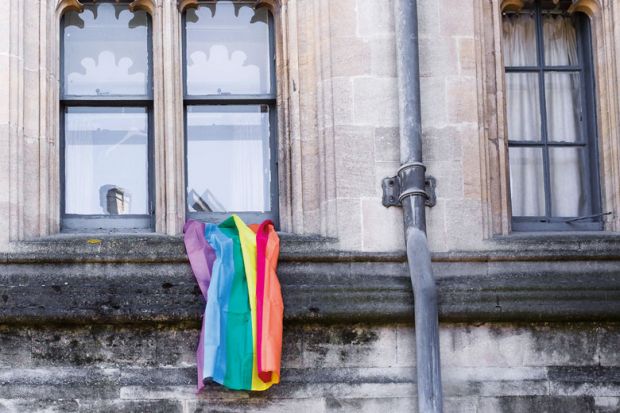Earlier this year, Stonewall, the LGBT rights charity, published its latest list of the UK’s 100 most inclusive employers. The list included a record 12 universities. And a recent study revealed that academics are more likely to be LGBT than people in almost all other jobs. But are things really as rosy as all that?
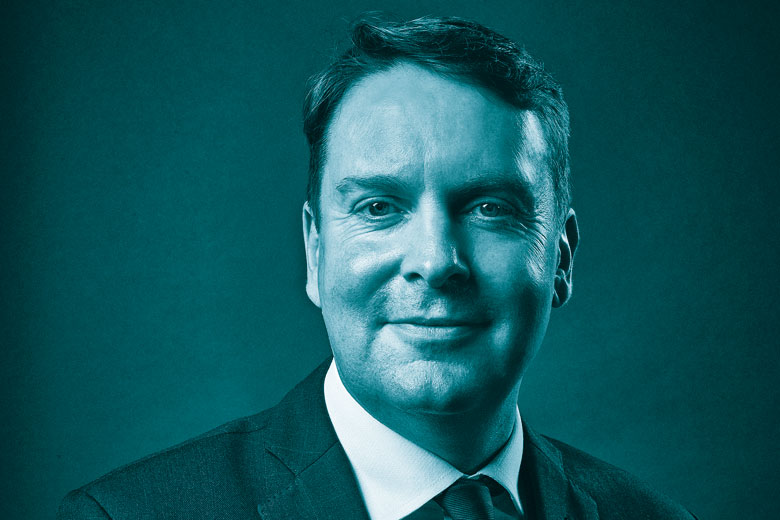
After about three years as v-c, I decided that I could do something to help students feel a bit more comfortable in coming out
I was a student during the 1980s and strongly felt the impact of the Aids epidemic, but I didn’t come out until I got my first job at the University of Salford in 1993.
Although that was the period of “pink plays” such as Jonathan Harvey’s Beautiful Thing and attitudes were loosening up, it was still quite a big thing to be an out gay academic. I was employed in the School of English, and I remember spending the first three months thinking I’ve got to come out as a gay man, to tell people what I really am.
I suddenly realised that a very good person to do that to would be the head of school, Angus Easson. I eventually stumbled up to him and said: “This is a ridiculous thing to say, but would you come and have dinner with me?” I remember feeling deeply embarrassed and fearful that my career would be stillborn, but he was relaxed, incredibly supportive and said all the right things.
I soon began to realise that universities were a very congenial environment for a young gay man. The trend has been very much in a positive direction, and that has been mirrored in legislation. De Montfort University was keen to celebrate the passing of the 2013 Marriage (Same Sex Couples) Act, and even took the controversial decision to award an honorary degree to the prime minister – just for that specific piece of legislation.
I have been very lucky in my life and haven’t often come across overt discrimination – except on one occasion. I use Twitter to communicate with my students, so it’s very easy for someone to write something nice or something nasty. Shortly after I became a vice-chancellor, some anonymous troll stole the identity of my partner and created a Twitter account called “Queen of DMU”. That was extraordinarily distressing and could have been very destabilising if we hadn’t felt almost a howl of indignation from the whole staff and student body.
People sometimes think that incoming vice-chancellors are going to treble the numbers of staff in their own discipline. In the same way, when I joined De Montfort in 2010, I was wary of a disproportionate focus on my sexual orientation. But after about three years in post, I decided that I could do something to help students feel a bit more comfortable in coming out.
I therefore agreed to be filmed for the DMUpride festival about my experiences. I talked about how I had been terrified. My father was the kind of guy who would make the odd comment when [camp comedians] Larry Grayson and John Inman came on television. My mother was a deputy headteacher at a very progressive school. But when I told my parents, my father was absolutely thrilled and couldn’t wait to go and tell his friends, while Mum said: “You’ll probably die of Aids, we won’t know the joy of grandchildren, but never mind, I still love you.” She couldn’t be more supportive now, of course.
I use that story to tell my students that some people may cause difficulties for you when you come out and you may even lose some friends, but it will still be the most empowering decision you’ve ever made: to be honest to yourself about who you are and what you are.
Last year, we announced a new Centre for Lesbian, Gay, Bisexual and Trans Research, led by Julie Fish, which will be very practically focused and will concentrate on the experiences of LGBT people within healthcare, including transition. I am personally much more interested in research that reclaims history, allowing hidden voices to be heard, rather than research that is banging a drum about how we are incredibly downtrodden.
And that is another thing I tell my students. When I came out, I had a conversation with a friend and said: “I know I’ve been masquerading as a bit of a straight man, but I want to share with you the fact that I am actually gay.” His initial response was: “But you were the football captain!” If you’re an extreme queer theorist, you might be absolutely outraged, but I would say that it wasn’t a malicious comment, it was just a perplexed one. I needed to work through with him why it is quite possible to be keen on football and to be gay.
I am still keen on football. I have a season ticket for Queens Park Rangers, I have been desperate all season for Leicester City to win the Premiership, and I play for the vice-chancellor’s team against the students’ sixth and seventh teams. I’m delighted to report that no one says: “God, it’s that old poof at centre back who happens to be the vicechancellor.”
Dominic Shellard is vice-chancellor of De Montfort University. His books include British Theatre since the War (2000) and Shakespeare’s Cultural Capital: His Economic Impact from the Sixteenth to the Twenty-First Century (co-edited with Siobhan Keenan, 2016).
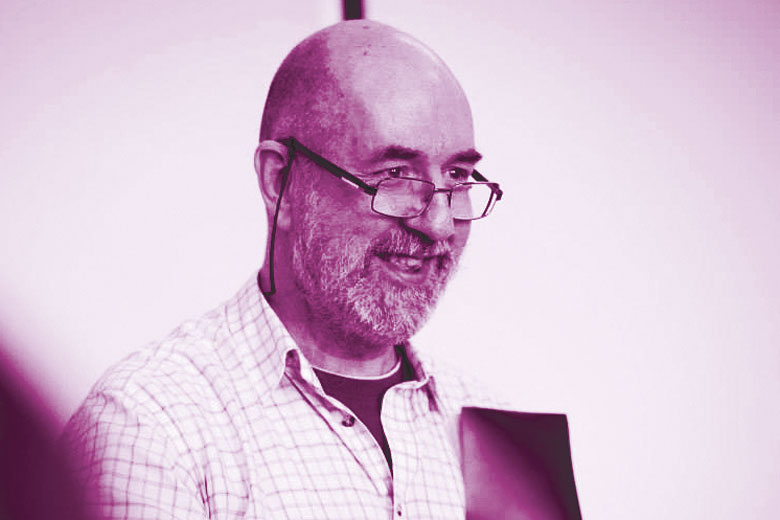
Although the atmosphere is now pretty comfortable for gay academics in the arts faculties, I’m far from sure that the same is always true elsewhere
In 1998, I was appointed the UK’s first professor of gay and lesbian studies, sparking tabloid headlines such as “First Cl‑arse Degree” and “So Campus”.
It had been a long haul to get to that point. My PhD was eventually published by Yale University Press as Articulate Flesh: Male Homo-eroticism and Modern Poetry, but I still had real difficulty in finding work, commuting across the country for little part-time jobs. I knew of several institutions that would not employ me because of the area of my research, and I suspected that more felt the same. Even my appointment at Nottingham Trent University in 1990 was initially for a year at a time.
What helped my career to catch up was the research assessment exercise. As well as the book, I had also been prolifically publishing follow-up essays, so I had the kind of track record my university needed. Once research is measured in purely instrumental terms, the controversial nature of a subject or otherwise doesn’t really come into play, and I was quickly promoted in my forties from junior lecturer through reader to professor. A History of Gay Literature: The Male Tradition was widely reviewed on publication in 1998. The only comment I got from a senior manager was that it had “earned the university £700,000 of free advertising”.
Much of the hostility to my professorship was based on the assumption that we were setting up degree courses in gay and lesbian studies that would encourage a pool of young people to come to university solely to learn how to be gay. The shadow home secretary of the time, Ann Widdecombe, called my appointment “a phenomenal waste of public money”, adding that it was “not at all clear…what kind of job [such a degree] would qualify someone for”.
Throughout my working life, I continued to come across homophobic remarks in the academic world, even in formal departmental meetings. Often it was little jokes about buggery, which people just didn’t see as inappropriate: in some strange way, they thought they were being friendly, acknowledging that this subject existed on their curriculum.
Although the atmosphere is now pretty comfortable for gay academics in the arts faculties of universities, I’m far from sure that the same is always true elsewhere. My job title conferred on me a sort of agony aunt status: people came to me from many disciplines, both within and beyond my home institution, asking if I knew of organisations or individuals in their cities or universities who could help them, whether pastorally or academically. Some felt very isolated and not at all confident that they should come out at work.
In reality, I always delivered optional elements of Nottingham Trent’s English and cultural studies degrees, but I also made sure that I taught gay material on the core courses, which gave me a chance to address students who were likely to be hostile, but also lesbian or gay students who were too frightened to opt for the gay courses, offering them some input that didn’t expose or embarrass them.
On the optional courses, I was always surprised by how few openly gay students I had. The vast majority were women who identified as heterosexual. I suspect that this was often to explore different versions of masculinity because they were so exasperated by their boyfriends.
Gregory Woods is emeritus professor of gay and lesbian studies at Nottingham Trent University. His latest books are Homintern: How Gay Culture Liberated the Modern World and an essay collection, The Myth of the Last Taboo: Queer Subcultural Studies (both 2016).
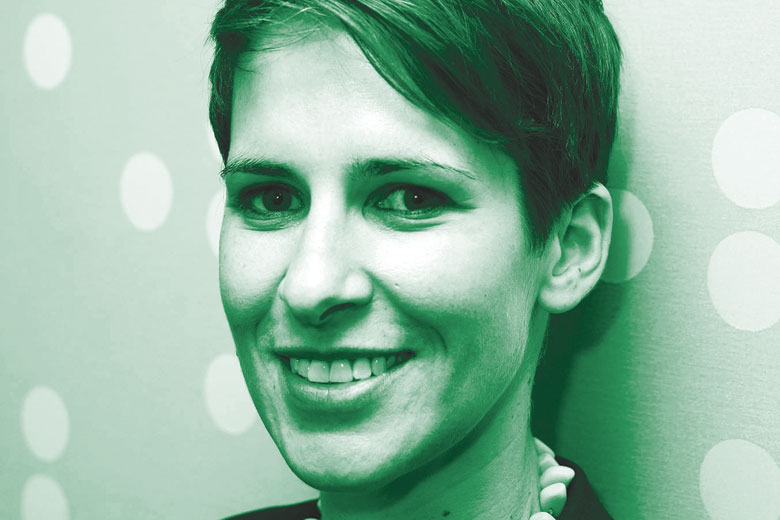
Much more can be done by universities for LGBT staff and students
During my undergraduate days at the University of Adelaide in the 1990s, I was vaguely aware of a Lesbian and Gay student society on campus. However, I was much more conscious of the fact that, according to whispered hearsay, the “university footbridge”, across which I walked every day, was the site of the 1972 murder of a university lecturer for homosexual activity by a group believed to be police officers.
The sense of the danger and illicitness that characterised my early experience is a far cry from the friendly environments, complete with supportive networks and formally implemented anti-discrimination practices, that greet many modern LGBT students. Yet Sheffield Hallam University’s #FreshersToFinals study, published last year, suggests that, although LGBT issues are increasingly visible in institutions’ policies, these often focus on bullying and discrimination – which is only one aspect of the needs of students and staff. And in preparing Australia’s first LGBTI University Guide in 2015, the country’s Human Rights Commission found that many universities were not meeting their anti-discrimination commitments or providing adequate health and welfare support or training.
Student and staff communities continue to be places where LGBT people experience harassment. While anti-discrimination policies are important in providing a procedural framework for protection and redress, they are in no way sufficient. Policies on staff and students transitioning gender are underdeveloped in many institutions, with action needed on the provision of both single-sex and gender-neutral bathrooms and sports facilities, as well as administrative processes around name and status designation and documentation, such as the reissuing of degree certificates. The Equality Challenge Unit provides a good guide for the higher education sector, and universities need to recognise that practices designed to support those who identify as lesbian, gay or bisexual are not necessarily going to meet the needs of trans and intersex people.
Policies around parental leave also frequently need revising, particularly as they apply to gay men who can all too easily fall through the net of state and employer provision. The unseen work that openly LGBT lecturers and staff do as role models for students needs to be much better rewarded, with institutions recognising its importance to the university community and the time and cost – both personal and financial – that it entails.
Diversity training, health and welfare services and curriculum change are crucial in shifting campus cultures. According to the Australian LGBTI University Guide, many institutions continue to do poorly in the provision of welfare and health amenities and careers advice. Alerting students to Stonewall’s Top 100 Employers list, or to organisations they can join to meet LGBT people in their chosen employment sector, would help. Students come to university from a variety of backgrounds, with some families more accepting than others. Policies need to allow flexibility around finance for those in difficulty, with universities actively supporting student groups in creating social spaces and resources for LGBT people.
Much also needs to be done in the area of content and curriculum. Textbooks need to be systematically re-evaluated to make sure that they do not omit or disparage LGBT perspectives. More broadly, teaching and research from across faculties might be integrated and showcased. University College London’s qUCL site is a great example of how LGBT events, people, courses and research projects can be profiled in a way that provides a focal point for future initiatives and an access point for staff, students and the public.
This latter point is crucial. As public institutions and major employers, universities have a role that extends beyond their walls. They need to engage with wider LGBT organisations in a range of areas that include sexual and mental health, civic space, law, diversity, community events and history. As educational institutions, they should work to ensure that campuses are not only places of safety and acceptance for LGBT people, but also communities that celebrate sexual alongside other forms of diversity. They should see this as central to their role in helping to create a vibrant society and robust democracy.
The biggest positive influence on me has been the support offered and the positive example set by the openly LGBT lecturers, administrators and fellow students I met during my graduate studies at the University of Oxford. I have sought to be similarly visible, for both my students and my colleagues. My discovery a few years ago that my first-year lectures at Brunel University London were being attended by several students enrolled in other subjects brought home to me that for many students such examples are still in short supply.
Tamson Pietsch is a research fellow in history at the University of Sydney and the author of Empire of Scholars: Universities, Networks and the British Academic World, 1850‑1939 (2013).
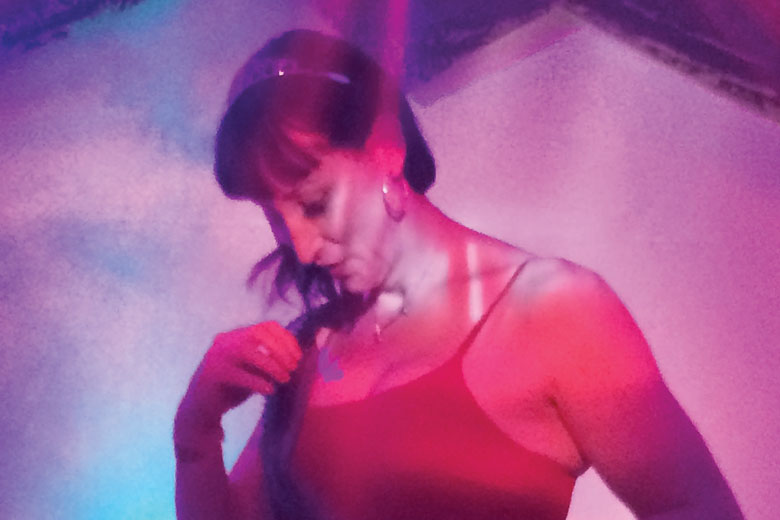
I was the first academic staff member to transition. Significant problems escalated, and it was about a year before the situation was brought under control
I made the decision to transition in late 2011, after finding it very difficult to continue presenting as a male. It was affecting my health, my personal life and my ability to do my job. By March 2012, I had informed the university’s HR department, who were initially very supportive, and I started presenting as Sarah at work.
As I was the first academic member of staff to transition, this proved to be a real jolt for the university. No one had thought through the difficulties that would arise because some colleagues had not been prepared or had issues with a transgender member of staff. Significant problems occurred early on and escalated out of control, driving me to the edge of a breakdown and proving a significant headache for the HR department, which had to play a fire-fighting role. It was about a year before the situation was brought under control. After a break from work to gather myself, and with the support of the director of HR, I stepped down from a post as director of the university’s e-Innovation Centre (a business incubator) and IT Futures team of consultants and took a teaching job within the School of Computing.
Returning after a break of two years, I was pleasantly surprised by the students I had the pleasure of teaching: each and every one of them treated me like a regular member of staff. Some even nominated me for the students’ union’s inspirational lecturer award, which was very heartening after the problems I had experienced with some colleagues. Yet other colleagues were extremely supportive and enabled me to feel more comfortable, which made coming into work less daunting.
As time has gone by, some staff are still unsure about how to interact with me post-transition and keep their distance, but many interact with me as they would with any other colleague. I hope that, in my additional role as equality and diversity representative for the school, I can help the last few resistant colleagues to learn to deal with everyone they meet as a person, instead of focusing on the way they look. I also hope to see an end to the use of my previous name and the incorrect pronoun “he”, which can be upsetting. Although some issues remain and are being handled as they arise, I hope that these will soon fade into obscurity, paving the way for other transgender members of staff to feel that it would not be a mistake for them to transition in the workplace. About 10 people – including students and staff – have approached me over the past few years seeking advice.
As both a transgender woman and one of the few women teaching computer science, I feel it is important to be visible and approachable in order to help others see that transitioning is not something to be afraid of, but a way for people to present as they are most comfortable – which is likely to make them both happier and more productive in the workplace. It saddens me that some of the students I support feel it is difficult for them to transition while studying, and I hope that I can do my bit as role model and supportive and friendly ear.
Sarah Slater is senior lecturer in computer science at the University of Wolverhampton.
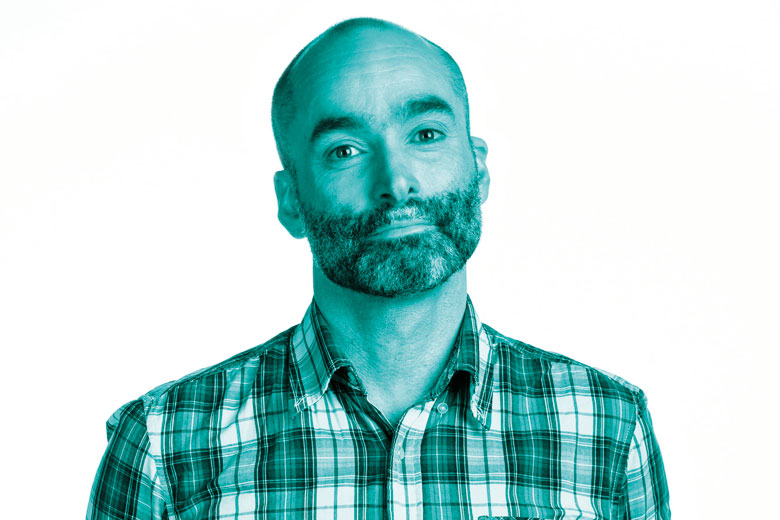
Many of those engaged in these early struggles and projects have sustained strong supportive networks. I have benefited hugely from these
As a gay academic working on queer themes in history, my feelings of comfort and belonging owe a lot to the emergence of new areas of scholarship, to my discovery of community among colleagues and students – and to good timing.
I began my postgraduate studies in the mid‑1990s, just as work on gender and sexuality had gained some credibility and was even fashionable in some places – not least at Queen Mary University of London, where I found myself. By the time I emerged with my PhD in 2000, much ground had already been laid and my specialism was not the impediment to gaining an academic post that it had been for the preceding generation. There was a growing sense that explorations of sexuality had a real significance to broader understandings of society, culture and politics – past and present.
In the 1970s and 1980s, the scholars in the UK who inspired me – Jeffrey Weeks, Lynne Segal and Sheila Rowbotham among them – wrote much of their early work outside the university sector or against the grain of the jobs they were being paid for. They were nurtured instead by political and community networks arising from women’s and gay liberation, from the Gay Left collective and also from the History Workshop movement and journal (which, from its inception, had taken gender and sexuality – and those working beyond the academy – seriously). Such scholars had to argue that women’s and gay history were not marginal or peripheral areas of study and had a place in university departments. Once hired, some of them (including those I’ve mentioned) faced overt disdain or were “benignly” expected to focus on other things seen as more significant.
There was some notable resistance to this marginalisation. At the University of Sussex in 1991, Alan Sinfield and Jonathan Dollimore established the Sexual Dissidence master’s programme, exploring history, literature, post-structural and queer theory. It felt especially urgent in the context of the Aids crisis, Clause 28 (which prevented UK local councils from “promoting homosexuality”) and a broader homophobic backlash. Unsurprisingly, it was derided as insignificant, trendy (an insult in this context) and part of a “Loony Left” agenda. But, tellingly, the programme is still running 25 years on.
Many of those engaged in these struggles and projects have sustained strong supportive networks. I have benefited hugely from these. Research and teaching projects have meanwhile allowed me to work with LGBT community groups and with archive and museum professionals – giving me sustaining anchor points outside academia.
At Birkbeck, University of London – my institutional home for the past 10 years – I have found further communities. One is a history department with a collective commitment to wide-ranging historical work (and the intersections that it fosters). Another is with colleagues brought together through the Birkbeck Interdisciplinary Gender and Sexuality research centre. A third is with students whose engagement with their studies has often been underpinned by much more direct experiences of discrimination and marginalisation than I have had to deal with. Being a white, middle-class man has made me an insider in more ways than my queerness has set me apart.
Matt Cook is professor of modern history at Birkbeck, University of London and the author, most recently, of Queer Domesticities: Homosexuality and Home Life in Twentieth-Century London (2014).
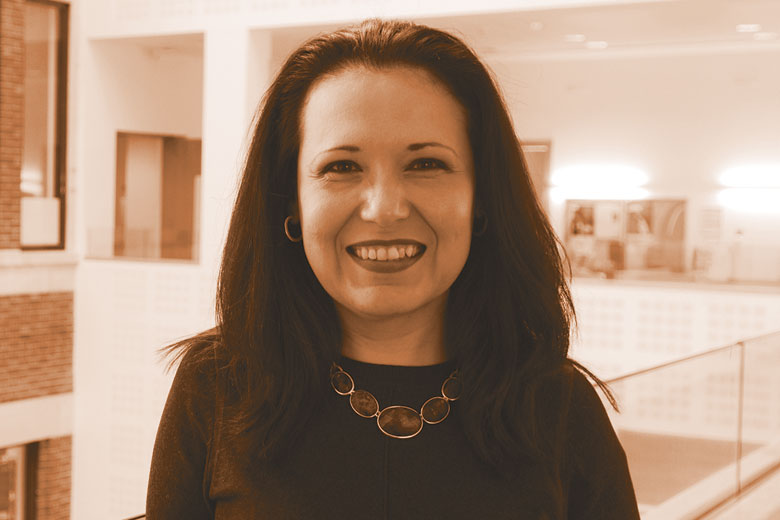
Could there possibly be so few LGBT engineers or academics? Is there something about the climate that puts off those who are LGBT?
As a female engineering academic, I have been involved in campaigns to increase the proportion of women studying and working in science, technology, engineering and mathematics, and to remove barriers to progression. Yet until recently, I had given far less thought to what it means to be LGBT within the sciences.
For me, coming out as an LGBT academic at work was a very public affair because I had been married to a male ex-colleague. However, contrary to my initial fears, the response from colleagues was overwhelmingly supportive and positive.
What led me to reflect more deeply on the LGBT issue was a meeting with faculty colleagues last year when we were discussing priorities in equality and diversity. When I mentioned sexual orientation, somebody said that the lack of complaints from LGBT engineering academics meant that there weren’t any problems to address. But once we started thinking about the number of LGBT individuals we knew about, we found that we could name only a couple (including me). It may also be significant that, apart from two energy companies, the engineering sector is absent from Stonewall’s Top 100 Employers for 2016.
Can there possibly be so few LGBT engineers or academics working in the field? Is there something about the climate in some disciplines and sectors of the economy that puts off those who are LGBT or, more likely, discourages them from being out at work?
What little research there has been on the topic suggest that there is. For instance, Erin Cech and Tom Waidzunas’ 2011 paper “Navigating the Heteronormativity of Engineering: The Experiences of Lesbian, Gay, and Bisexual Students”, speaks of a “chilly and heteronormative” climate in engineering that LGBT students navigate with “coping strategies which can require immense amounts of additional emotional and academic effort”, such as “‘passing’ as heterosexual, ‘covering’ or downplaying cultural characteristics associated with LGB identities”.
Although I have been able to thrive in an inclusive institution, I still recognise some of these points. My work as an academic has taken me to countries where being LGBT is unacceptable or even a crime, so I have had to hide that part of my identity. Closer to home, colleagues at networking events often ask questions about my husband. I was even told once: “But you look so straight!” – whatever that means!
I am often asked whether I identify as a gay woman, a female engineer, an international academic or something else. My answer is always: I identify as Elena! Yet our sexual orientations are undeniably part of what makes us who we are. I am very fortunate that circumstances and then choice have allowed me to be very open about my “gayness”. But I suspect that not everyone, even in Western universities, is so fortunate.
Elena Rodriguez-Falcon is professor of enterprise and engineering education at the University of Sheffield.
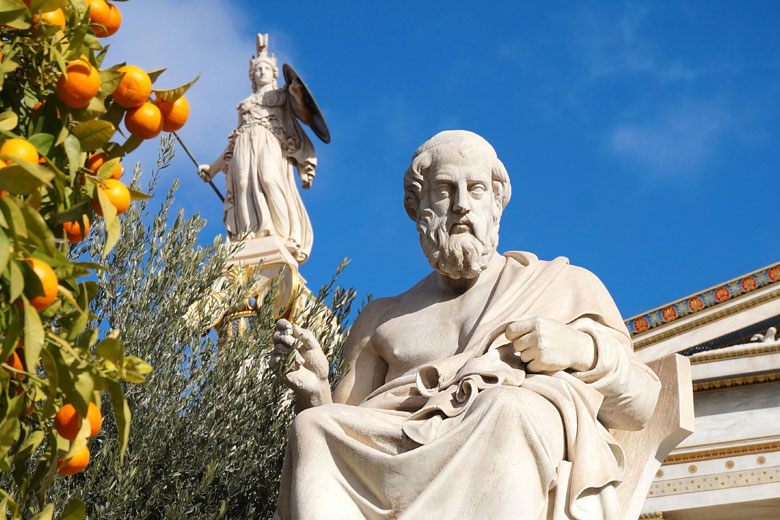
On Plato and Greek love: changing views of homosexuality in the academy
Speak of homosexuality in universities and, as like as not, you will evoke images of willowy, upper-class young men at Oxbridge punting, reading Plato to each other and taunting passing oarsmen with blown kisses. Meanwhile, smaller numbers of tweedy bluestockings might be making ardent declarations in the enclosed hothouses of the women’s colleges.
The master of Balliol College, Oxford, Benjamin Jowett, introduced Plato into his Oxford lectures in the 1840s, but he was unimpressed if anyone put what he learned into practice. When an undergraduate sent the classicist Walter Pater a sonnet sequence praising male love, and Pater responded with a letter ending “Yours lovingly”, Jowett sent the youth down and never spoke to Pater again.
The political philosopher G. Lowes Dickinson remembered a telling moment from his Cambridge days: “one evening, in a talk with a student of Classics, I discovered that the Greek love, as I had read of it in Plato, was a continuous and still existing fact.” Even if, generally speaking, Oxford dons were less inclined to encourage homoeroticism than those at Cambridge, to the French moeurs oxfordiennes meant homosexuality.
In Evelyn Waugh’s novels, the aesthete-queen is the embodiment of modernity. Anthony Blanche, in Brideshead Revisited, has, for instance, dined with Proust and Gide, and been even closer to Cocteau and Diaghilev. It follows that one of the key signs of modernity is acceptance of homosexuality. The attacks on these men by sportsmen are taken from life; at Cambridge, Robbie Ross – Oscar Wilde’s first male lover – was thrown into the fountain at King’s College. Mere high jinks, of course, but such incidents represent a serious stand-off between tradition and Modernism.
The historian Lillian Faderman has written about romantic friendships at American women’s colleges across the turn of the 19th and 20th centuries. Rosamond Lehmann’s novel Dusty Answer (1927) portrays relationships at Cambridge between women who are expected even by their gay male friends eventually to marry and have children. Lehmann had herself won a scholarship to Girton College, Cambridge in 1919.
What of the actual study of homosexuality? Most early sexology was framed outside the academy, even if it made prolific use of academic libraries. Things came together in Berlin in 1919, when Magnus Hirschfeld opened his Institute for Sexual Science. In its first year, 4,000 people visited and 1,250 lectures were delivered. The Nazis sacked it in May 1933: their burning of its books is one of the key images of the era. Not until the foundation of the Kinsey Institute at Indiana University in 1947 would so much material about variant sexualities again be gathered in a university.
It is emblematic of the gulf between the study of homosexuality and the mere indulgence of it that, when André Gide was given an honorary degree by Oxford in 1947, the famously homosexual don Maurice Bowra refused to attend officially (although he did watch proceedings from the crowd).
When deciding whether to accept the invitation to chair the Committee on Homosexual Offences and Prostitution in 1954, John Wolfenden, vice-chancellor of the University of Reading, debated whether acceptance would damage the reputation of his institution and even of universities in general. As it happened, his fusty academic manner proved an advantage when conveying the seriousness of his committee’s approach to such lurid matters.
In 2009, Harvard University established the F. O. Matthiessen visiting professorship of gender and sexuality. Back in 1916, the novelist Malcolm Cowley had been irritated to find a generation of Harvard undergraduates who were trying to recreate the Oxford of the 1890s in their aesthetic manner, dress and reading matter. It seems things have moved on since then.
Gregory Woods
POSTSCRIPT:
Print headline: Pride and prejudice
Register to continue
Why register?
- Registration is free and only takes a moment
- Once registered, you can read 3 articles a month
- Sign up for our newsletter
Subscribe
Or subscribe for unlimited access to:
- Unlimited access to news, views, insights & reviews
- Digital editions
- Digital access to THE’s university and college rankings analysis
Already registered or a current subscriber? Login
